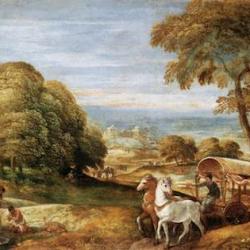Traveling by sea to Rome, Paul encounters a storm, plunges into the sea and then arrives at Malta. He is an unreluctant Jonah, cross the sea westward to call a Gentile empire to repentance.
But why the unusually detailed travelogue in Acts 27? Sidon, Cyprus, Cilicia, Pamphylia, Myra in Lycia, Cnidus, Fair Havens, and on and on: Luke provides a step-by-step record of the trip. The closest analogy is Numbers 33: “the sons of Israel journeyed from Ramseses, and camped in Succoth. And they journeyed from Succoth, and camped in Etham . . . . And they journeyed from Etham, and turned back to Pi-hahiroth . . . .” Paul is not only Jonah but Israel journeying to the promised land of . . . Rome!
There are a couple of ways to view this analogy.
First, from the perspective of creation: Adam is created in the garden, but the promise is held out that he will someday ascend to the land, to the source of the river that flows from the garden and splits to the four corners of the earth. Israel journeys from Egypt to a land, and occupies the land as a quasi-royal nation. Paul is like a new Adam and new Israel who is journeying toward the crown land of Rome. A Jewish apostle arrives in Rome to announce that Jesus, the new Adam, has ascended to the land and rules over the nations.
Second, if Paul’s sea voyage is a repetition of the journey from Egypt to the land, his plunge into the sea is not only a Jonah episode but new exodus. Yet, it is an exodus ironically reversed. In Exodus/Numbers, the sea crossing comes first and then the 40 years of wandering. In Acts, the travelogue comes first, and then the shipwreck. The deeper reversal is, of course, that Israel moves from a Gentile nation, through water and wilderness, to the land promised to Abraham, while Paul moves from Jerusalem, through wild water, to the capital of a Gentile empire.
That reversal repeats on small scale the larger reversal of Luke-Acts; in Luke, everything moves toward Jerusalem, but in Acts everything moves away (after chapter 8). But the reversal is not entirely reversal: When Israel entered Canaan, they entered a land occupied by Gentiles in order to conquer it. Paul, apostle of a new Israel, enters Rome to cast down altars and begin building the Lord’s house among the nations.











